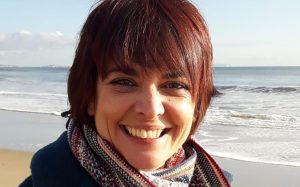Reading graduate, Dr Sarah Lewis, believes there is so much more to people than their worst mistake – a belief that drives her work in prisons. Dr Lewis talks to CONNECTED about providing positive opportunities for prisoners and how they became the forgotten part of society during the pandemic.
 As the Director of Penal Reform Solutions – an organisation that specialises in promoting growth, positive psychology and transformation in prisons – Dr Lewis designs and delivers programmes that aim to develop and improve prison environments to achieve greater safety and well-being.
As the Director of Penal Reform Solutions – an organisation that specialises in promoting growth, positive psychology and transformation in prisons – Dr Lewis designs and delivers programmes that aim to develop and improve prison environments to achieve greater safety and well-being.
Dr Lewis’ passion for her work comes across clearly as she explains what motivates her: “There’s something about seeing people in prison and the strength and potential they have that inspires me. I’ve never experienced so much respect and kindness as I have in prisons. If you create a safe and positive environment, you can bring the best out in people.
“My life mission is to promote and raise awareness of the goodness that still exists in these people.”
CONNECTED talks to Dr Lewis about her journey – from a psychology student at Reading to a life-affirming career, the devastating impact COVID-19 has wreaked on prisoners, and her initiative which aims to drive greater collaboration with universities.
A process of elimination
Dr Lewis studied BSc Psychology at the University of Reading and reveals that finding her true calling wasn’t always plain sailing.
She said: “I worked really hard at Reading and had some amazing lecturers – the teaching quality was brilliant. I did three subjects in my first year and, to be honest, I pretty much failed psychology that year compared to my other two subjects, but I enjoyed it so much that I was determined to keep going with it.
“Psychology is all about how people think, and I knew from an early age that I wanted to work with people.
“Aged 18, I worked in a psychiatry unit and got attacked so I ruled out a career in that area. I’d always wanted to be a forensic pathologist but due to a hand disability I also had to rule this out.
“After graduating from Reading I got a job in a prison but found it really tough, so I decided to do my PhD on therapeutic correctional relationships and lectured for a while at Portsmouth University. In 2004, I went to Norway and visited the prisons there and that was it; I figured out what I wanted to do.
“In a way, my career turned out to be a process of elimination until I had my epiphany in Norway, when I suddenly knew what I wanted to pursue.
“Norwegians talk about ‘who do we want to be our neighbour – an active citizen who helps and supports, or someone who is institutionalised?’ This really resonated with me; the majority of prisoners will come out one day and walk among us, so we should give them the best chance possible to focus on living meaningful lives.”
Changing the conversation
Since 2004, Dr Lewis has worked with and researched probation and prison environments, setting up her own company – Penal Reform Solutions – in 2016.
She said: “Our mission is to reduce social harm and promote social good in a very inclusive manner.
“We aim to change the conversation about punishment and challenge the idea of a punitive system, looking at how we can pursue a positive way to transform people and add meaningfulness to their time in prison.”
Dr Lewis’ academic expertise is key to her work, but she insists that working with practitioners and those with a lived experience, including former and current prisoners, is the most important element.
She explained: “One of our real success stories is a man named Kam – when I met him in prison he wanted to work in bricklaying, but it turned out that he secretly aspired to be a writer and director. We provided him with the opportunity to write a screenplay in prison and, now he’s been released, he’s going to university to study this.
“We are so proud of all the people we work with in prison. Our programmes help prisoners to become strong people who are confident in terms of their goals. We continue to provide support once prisoners are released, and my phone is always on for that conversation.
“Progress looks different to each person, but they are all moving forward.”
The hardest year
Dr Lewis shares an insight into the impact of COVID-19 on prisoners, calling 2020 the hardest year prisoners have ever faced.
She said:
“During the pandemic prisoners were locked up for 23 hours a day, they were only allowed showers every two weeks, they lost contact with their families and the outside world, they lost all employment opportunities, all temporary release and parole was cancelled, and there were no transfers in or out.
“These conditions massively impacted growth and progression. What became more challenging as the world started to unlock in the summer of 2020, is that prisons weren’t able to move forward to match this. We received a lot of difficult letters and distressing, heartfelt phone calls from our team in prison who we couldn’t work with during this time.
“To try and do something to help we sent CDs into prisons with mindfulness recordings on them, and we sent activities in. We also tried to amplify the voices of the families who were unable to communicate with their loved ones, with no end in sight as there was no planned exit strategy for prisons.”
When asked how she felt about government support for prisons during this difficult time, Dr Lewis revealed: “The government did very little in terms of instructions about prisoners. For example, pregnant women were told they would be released as a priority, but in reality only 12 were released.
“Generally speaking, prisoners were a forgotten part of our society during the pandemic.
“Prisons have done very well at preventing a high death rate and avoiding the worst outcome from the pandemic, but at the expense of completely locking prisoners up. And it’s not over yet.”
Widening engagement
Despite all the challenges caused by the pandemic, Dr Lewis is eager to get back into prisons to continue her positive work. She is also proud to be working with universities, creating opportunities for both students and prisoners.
She said: “We currently have four university interns working with us and I hope to increase that to eight a year. We try to mix up the background of our interns a bit, for example we currently have a human geography student and a criminology student working with us.
“We also work with universities on widening participation. We encourage and support prison leavers by educating them about the application process and offering advice during their higher education journey. Kam, who I mentioned earlier, has secured a university place and we couldn’t be prouder.
“The growth alliance is all about connecting people up, so if anyone wishes to support the projects we do, be a part of it, or just find out more information, please get in touch.”





